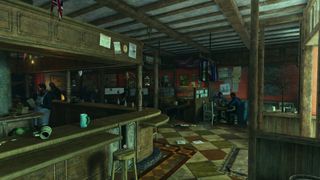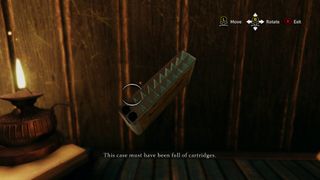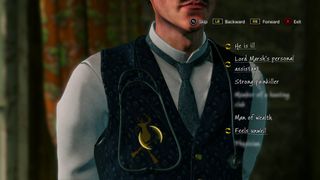Sherlock Holmes: The Devil's Daughter review — The return of a crime-solving extraordinaire
Sherlock Holmes: The Devil's Daughter is a beautiful, handcrafted representation of 19th century London, held back by flaws in its design.

Sherlock Holmes sits among the most iconic characters in classic literature, treated with an extensive number of films, televisions shows and more recently, games. Ukrainian developer, Frogwares, has been developing Sherlock Holmes games for fourteen years now, releasing ten games featuring the detective since the studio's formation. The series has continued to evolve over this time, with 2014's 'Sherlock Holmes: Crimes and Punishments' most recently bringing Holmes' stories to the current generation of consoles.

Little over a year later, Focus Home has delivered its follow-up in an attempt to expand on Holmes' story and improve on the original experience. The Devil's Daughter reworks that game's art direction and approach to level design, and while they make for an appealing package, unintuitive puzzles taint the experience.
A detective's tale
Story
The premise of The Devil's Daughter starts similarly to any Sherlock Holmes story, with a mystery that needs to be solved and a trail of clues to follow. Within the carefully crafted world of 19th century England lays a history and narrative, which continues to evolve upon exploring the city.
A varied cast of talented voice actors deliver outstanding performances, which form emotion-driven, dynamic conversations.
The game establishes itself within a traditional representation of Victorian London, a society built around divided classes and a contrast in lifestyle. Staying true to the period, the polarized lifestyles of his clients resonates during cases, telling of the harsh struggles encountered in daily life.
In doing so, The Devil's Daughter also manages to break away from stereotypes of the times, such as the parodic accents often portrayed in other interactive media. A varied cast of talented voice actors deliver outstanding performances, which form emotional, dynamic conversations. A notable performance comes from Sherlock Holmes' voice actor, who successfully depicts his witty persona. Unfortunately, this voice acting has been paired with low-quality facial animations, which stands out in a medium which frequently adopts motion capture.

Search and Deduct
Get the Windows Central Newsletter
All the latest news, reviews, and guides for Windows and Xbox diehards.
Gameplay
The Devil's Daughter's narrative is split into five main cases, which interlink into a cohesive, story-driven experience. On the surface, the game acts as a unique hybrid between a traditional point-and-click title and a third-person action/adventure game. Also interwoven into these genres are a varied collection of optional mini-games, that change up gameplay for a short period of time. These are nothing more than intermissions to pad out gameplay, but are enjoyable nevertheless.
Aside from mini-games, the game's pacing also fluctuates by switching the playable characters between multiple members of the cast. This provides a different viewpoint on the game's world, while also introducing new gameplay opportunities.

The second layer to case progression is the deductions made from visual clues, which add a personal edge to story progression.
Aside from inter-character relationships, the story unfolds while exploring the game's environment and picking up the scattered clues. Using these clues, Holmes finds new leads, which distinctly breaks cases into smaller chapters.
The second layer to case progression is the deductions made from visual clues, which add a personal edge to story progression. From various details in the world, Sherlock can make deductions by culminating the information he has collected. From an on-screen map, clues can be linked together, which continue to build up as each case progresses.
When all clues have been collected, the player is asked for a final conclusion, where a moral choice has to be made. However, the deductions made from clues aren't always correct, which can result in wrong judgments being made on Holmes' behalf.

Discovering clues in The Devil's Daughter isn't a creative task, with its mechanics built around exploring every aspect of the game's world, with no flexibility and player choice. The game fails to guide players when searching for clues and when combined with unintuitive design, ended up as a frustrating experience. At points, searching for evidence resulted in aggressive button-mashing at objects in the game's world in the hope of finding further clues.
The game places a focus on searching for clues, without giving players the freedom to frequently deduct from findings.
This is worsened by the extremely inflexible implementation of clues, which halts progression until certain requirements have been met. At points, the game revealed locations to visit in search of answers, but limited access until smaller, irrelevant details had been discovered.
Sadly, the game places a focus on searching for clues, without giving players the freedom to frequently deduct from findings. This focus restrains the game's storyline from feeling truly rewarding and strays away from the qualities associated with Sherlock Holmes' character as a mastermind.
These issues lead to the biggest problem with The Devil's Daughter and its major issues in puzzle design. The player is often left to their own devices to understand the game's mechanics, which wouldn't be such a prevalent issue if puzzle design felt intuitive. Instead, the game is cluttered with vague instructions that culminate into a frustrating and confusing experience.

Conclusion
Sherlock Holmes: The Devil's Daughter delivers a gratifying story-driven experience, interwoven into an authentic representation of 19th century London. With great voice talent behind its cast, the game manages to form engaging inter-character relationships. While the game is held back by its level design and some unintuitive mechanics, it provides a consistent depiction of a mystery-filled London.
Pros:
- Gripping narrative
- Beautiful, handcrafted representation of 19th century London
- Great voice acting talent
Cons:
- Unintuitive puzzle design
- Searching for clues feels routine
This review was conducted on Xbox One using a copy provided by the developer.
Matt Brown was formerly a Windows Central's Senior Editor, Xbox & PC, at Future. Following over seven years of professional consumer technology and gaming coverage, he’s focused on the world of Microsoft's gaming efforts. You can follow him on Twitter @mattjbrown.

